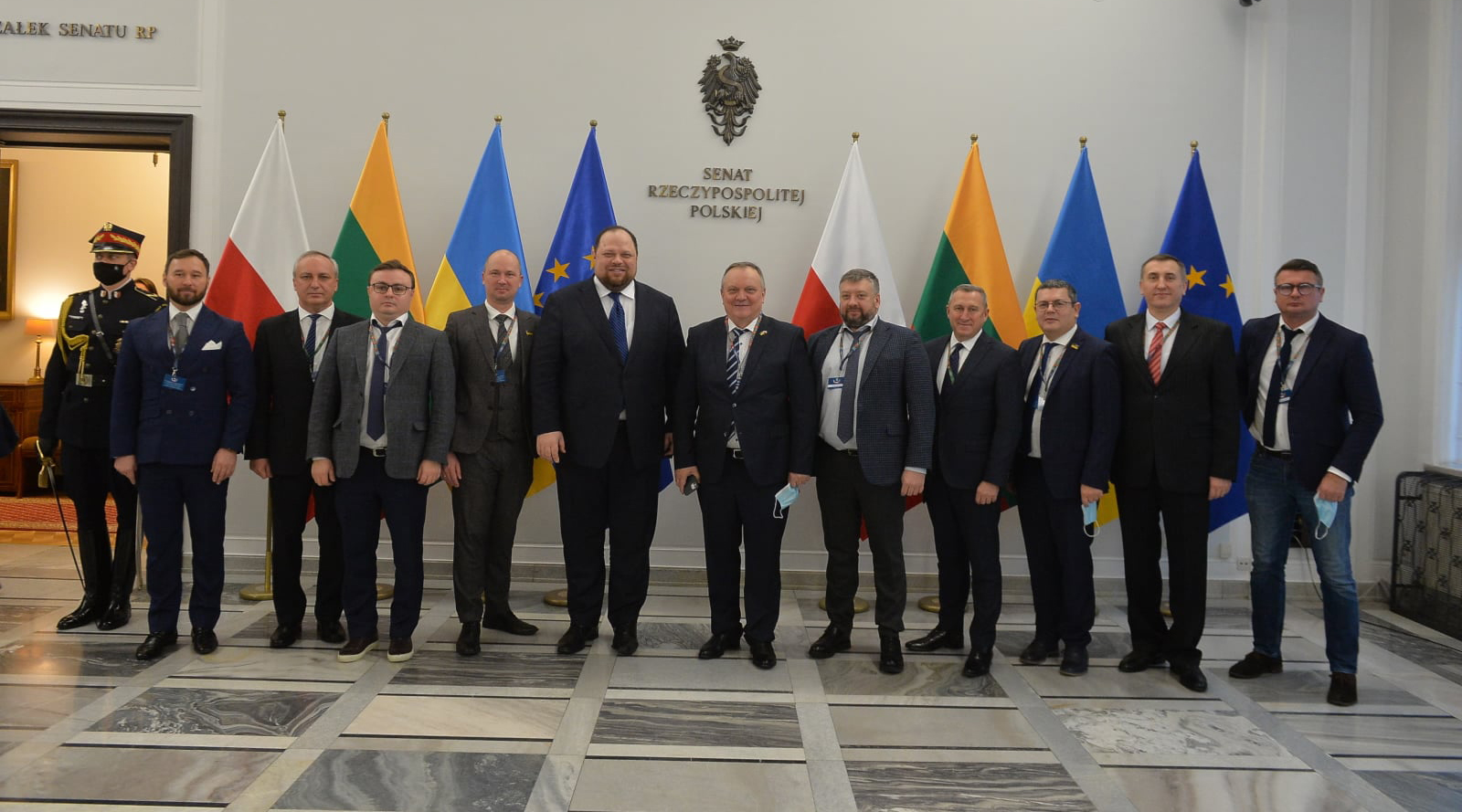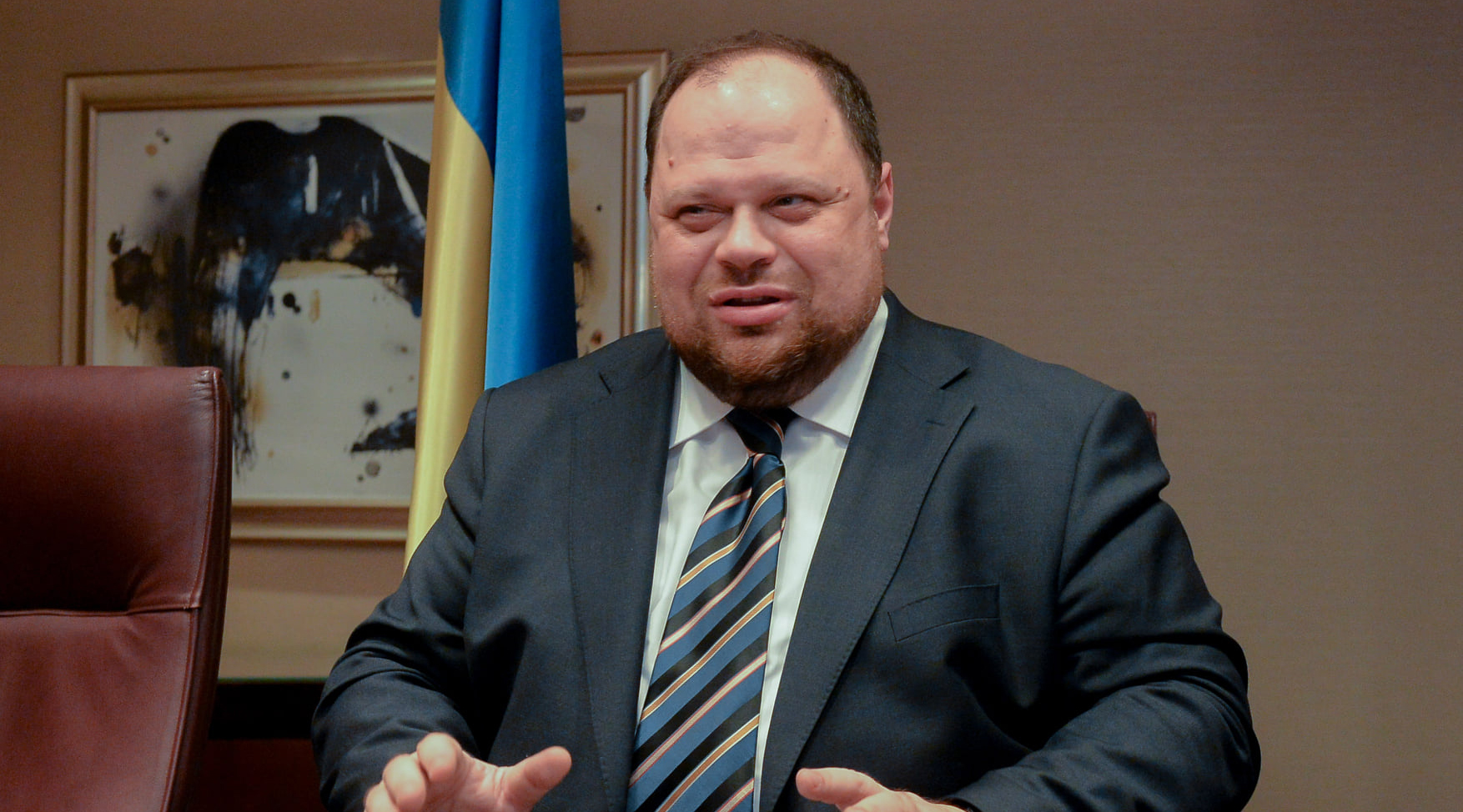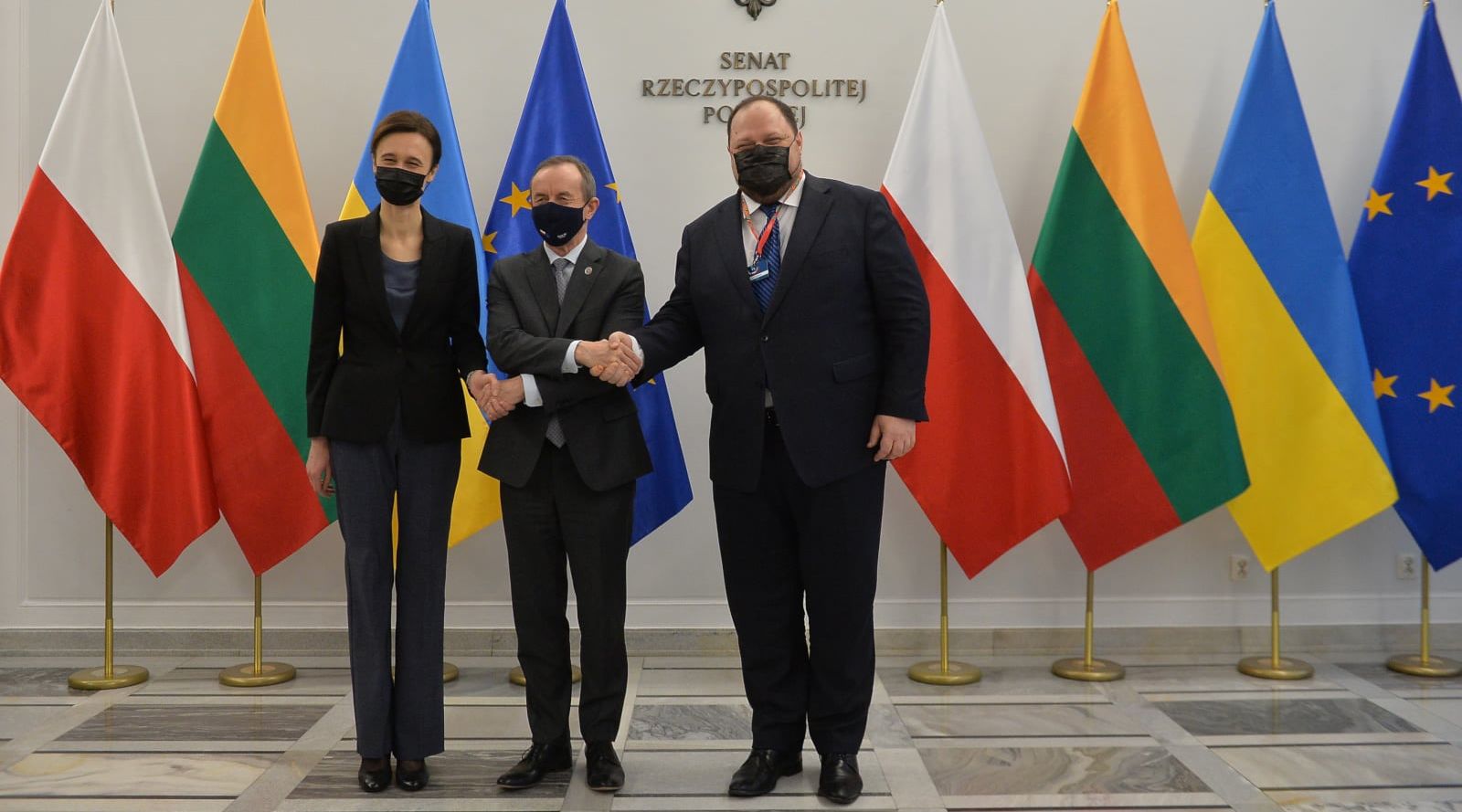The 11th session of the Interparliamentary Assembly of Ukraine, Poland, and Lithuania took place in Warsaw on December 5-6. During the two-day session, the legislators of the three countries discussed important issues regarding the security situation in the region and tripartite relations, adopting a final document following the meeting.
The Ukrainian delegation in Warsaw was headed by Chairman of the Verkhovna Rada of Ukraine, Ruslan Stefanchuk. In an interview with Ukrinform's own correspondent in Warsaw, the Rada head spoke about the outcome of this year's Assembly, assessed the state of Ukrainian-Polish relations, and shared his views on the prospects of a number of important bills.

THE ERA OF LARGE ASSOCIATIONS IS PASSING AWAY
- Mr. Chairman, the Interparliamentary Assembly of Ukraine, Poland, and Lithuania, the three countries that shape up the Lublin Triangle, took place in Warsaw. How important and necessary today is this platform for tripartite negotiations?
- If you look at the history of the three countries, now we’re seeing a logical continuation of our good neighborly relations, which has lasted for over a millennium. We are now taking our historical alliance and multiplying it for the future. When I met with the speakers of the Lithuanian and Polish Parliaments on Sunday, although it was the first time I met with Mr. Tomasz Grodzki (Marshal of the Polish Senate), good relations between our countries immediately gave us the opportunity to speak in a completely friendly tone.
In the global context, the era of large associations is passing away. Now we need to focus, first of all, on regional friendly associations, because such countries have similar economic, political, and security interests. Ukraine, Poland, and Lithuania have plenty of things in common in these areas.
The soundness of this approach is confirmed by the fact that we saw almost no disagreements as to the final document signed following the Inter-Parliamentary Assembly session.
Holding the assembly gives us the opportunity to coordinate our actions, share current information that each of us has, as well as identify areas of joint activity.
The creation of the Lublin Triangle between our countries last year was a very good step. The Interparliamentary Assembly of Ukraine, Poland, and Lithuania, which had been set up long before that, marked certain points, and the Lublin Triangle connected them all with lines.
- What did you focus on during the session of the Inter-Parliamentary Assembly?
- First, we addressed the issue of Russia’s military aggression, condemning Russia's actions both in Crimea and in the temporarily occupied territories. Secondly, there was the issue of energy security in the context of Nord Stream 2, the construction of a nuclear power plant in Ostrovets (Grodno region in Belarus - ed.), and unreasonable gas prices for Europe. In addition, we have raised a number of political issues related to the (Alexander - ed.) Lukashenko regime and its influence on our countries.
I really liked the fact that all three delegations were amending the draft final document not only in the interests of their own countries, but also in those of the other two. That is, there was no such thing as everyone stands for themselves. And this is very important. If other countries amend something in the text in the interests of Ukraine, it means that they want to help us counter certain threats. This testifies to true cooperation and mutual respect for each other. In total, we discussed the 38 points that appeared in the final document.
- Are there any plans for inter-parliamentary cooperation next year? What will be among the priorities?
- It will all depend on the development of the situation across the world. Special agencies are aware of what is happening on the borders of Ukraine. We see the artificial migration crisis provoked by Belarus on their border with Poland. We need to understand how this will affect Ukraine and other countries across the region. Therefore, most of the issues of our next XII session of the Assembly (to be held in Vilnius - ed.) will follow from how the agenda of the current meeting will be implemented and what the situation will look like at the time the next one is held.

IN HISTORICAL ISSUES WITH POLAND, THE PRINCIPLE OF "FORGIVE AND APOLOGIZE" SHOULD APPLY
- The international situation around Ukraine is quite complicated amid Russian military buildup near the country's borders – not just on the line of demarcation - and possible escalation on the Ukrainian-Belarusian border. What kind of support can Kyiv expect from its partners, including Warsaw and Vilnius?
- Kyiv responds to crises in a timely manner. As soon as information about the crisis on the Polish-Belarusian border emerged, the Verkhovna Rada immediately voted in the bill, which allowed Ukrainian border guards to use firearms. In addition, we voted on some issues related to securing the Ukrainian border. We also adopted our next year’s budget, which laid down a number of steps to demarcate the border, as well as some other aspects related to our border issues.
Ukraine's support in Poland and Lithuania remains palpable. For example, according to a recent poll (run by SW Research Center for the Rzeczpospolita outlet - ed.), 62% of Poles stand in favor of NATO providing military assistance to Ukraine if required. This proves that the Polish authorities cannot help but listen to their people. I believe that in the Baltic States, the figures in similar surveys would be no lower. This means that we’re not only talking, we’re also ready to act to ensure our country’s territorial integrity.
- How do you assess the Ukrainian-Polish relations, and what are the tracks along which they could be improved?
- It’s always only the economic aspect that I’m dissatisfied with. On all other issues we have an absolute understanding or a similar vision. There are a number of issues related to economic relations that need to be addressed. This will contribute to an increase in the trade balance between our countries. There is great potential for our economic cooperation. Poland is currently Ukraine's second-largest trading partner in the world (after China - ed.) and we may see more than $10 billion in trade turnover by the end of this year. There are still infrastructure projects whose implementation pace could be raised.
At the same time, we have complex historical issues. Countries that share a long common history almost always have some historical disputes. I think the principle of "forgive and apologize" should be applied in our relationship. We must treat all historical issues with dignity, while building our future pragmatically.

RADA SUPPORTS THE IDEA OF MULTIPLE CITIZENSHIP
- Since 2014, hundreds of thousands of labor migrants from Ukraine have come to Poland. Currently, there are about 1.5 million Ukrainians in the territory of Poland. What assistance can they expect from the Ukrainian state?
- The Consulate General of Ukraine will soon open in Wroclaw to render services to Ukrainians living in the region.
At the same time, on December 1, the president of Ukraine submitted to the Verkhovna Rada a completely new and extremely interesting document, which we have been working on for more than two years already. This is a bill on multiple citizenship. The ideology is as follows: we recognize that there is a large outflow of migrants. This is because Ukraine is not yet ready to offer its citizens decent wages within the country. Therefore, everyone is looking for where they would be better off. Given these economic realities, we’d like to appeal to those Ukrainians who have already decided to leave Ukraine or those who have been living beyond Ukraine for several generations. Multiple citizenships will give them the opportunity to not just identify as Ukrainians or have some internal piety, but to become full-time citizens of Ukraine. The Verkhovna Rada supports this idea. In fact, it will unite 65 million Ukrainians around the world.
We know that we have strong diasporas in Poland, the Czech Republic, Canada, the United States, Australia, and Brazil. We are willing to support these people and connect them with Ukraine as their Motherland.
I hope that the law will be passed as early as next year: there is a bill, there is political will, so we will start its first reading early next year.
This bill also clearly states that citizens of a country that is recognized as an aggressor power in relation to Ukraine shall not be allowed to hold it (Ukrainian citizenship as their second one - ed.). In addition, the Cabinet of Ministers of Ukraine shall draw up a list of the relevant states. The plan is that there will be an ambassadorial nature of relations with such countries. For example, if we are negotiating multiple citizenships with Canada, we will propose to introduce a visa-free regime first in order to immediately build a perspective for the future. Given the weight of the Ukrainian diaspora in Canada, I think the issue may be resolved positively. We will also work with the United States and other countries. Thus, we wish to see pro-active work of Ukrainian diaspora communities resume. It is very important for us that the Ukrainian diaspora becomes the third force as Ukraine's ambassador to the world. That is why we are exploring mechanisms to allow these people be proud of Ukraine and their Ukrainian citizenship. For us, this is a priority.
- And what about these citizens’ voting right?
- Everything will depend on the final draft of the bill to be voted on. However, we anticipate that such citizens will have to decide in which country they will ultimately vote.

LOSING TRUST IN GOVERNMENT INSTITUTIONS IS INHERENT IN THE UKRAINIAN PEOPLE, AS WELL AS A GREAT DEMAND FOR JUSTICE
- Recently, you drew attention to the possibility of remote voting in parliament. Doesn’t the initiative pose great risks?
- Remote voting is not a legal issue, but a technical one. If technical security experts tell me they can guarantee security, then the lawyers will translate it into a legislative formula.
Of course, there are some risks. But now we can do a lot through a smartphone without leaving home. From December 1, we can fulfill the long-sought dream of any Ukrainian – changing residence registration without the need to physically report to any offices. Therefore, the question is only about data security. This should be a completely clear and transparent procedure that people trust. But trust doesn’t appear at short notice, it has to be nurtured for years. Therefore, thanks to the Diia project (government-run mobile app offering a number of streamlined digital services - ed.), we are building people's trust in government institutions.
There are two things inherent in the Ukrainian people: losing trust in government institutions and a having a great demand for justice. Therefore, based on this logic, we need to secure these two issues.
- During a recent press marathon, President Volodymyr Zelensky said the lawmakers could ask the Constitutional Court for clarification on the possibility of changing election schedules. How likely are such perspectives?
- There are two norms in our Constitution that have certain contradictions. On the one hand, one article of the Constitution says that Ukraine’s parliament shall operate for five years, and on the other hand, it says the elections shall be held in the fifth year. If it's four years, it's 2023, and if it's five years, it's 2024. However, I’m convinced that the President will not appeal to the Constitutional Court. I don't know what the deputies will do, but I have decided for myself that I will not appeal to the Constitutional Court either. However, if 45 deputies draft an appeal to the Constitutional Court, the latter will issue a judgment. I think that such a judgment could only harm the authorities. We are well aware that the Ukrainian people have never accepted neither Leonid Kuchma's decision on the third presidential term nor other initiatives where the government has tried to extend own powers.
- You co-authored the bill on the local referendum. When will it be considered in Parliament? Who will be able to initiate it and what issues will be allowed to be put to a referendum?
- The law on the local referendum was submitted to the Verkhovna Rada and then forwarded to the Venice Commission. I very much hope we will see the Commission's opinion in January, and I hope even more that it will be a positive assessment. Following the decision of the Venice Commission, we will launch its consideration in parliament. This is a very important bill. The responsibility for the state lies not only with the government, but also with every citizen. Therefore, every Ukrainian who votes in a referendum will have to bear responsibility for their decision, because only a strong stance of a territorial community will allow making the right decisions in favor of the state.
In addition, any referendum has three main functions: the function of a stopcock, when authorities start moving in the wrong direction; the function of shaping the agenda, that is, what relates to the people; the function of giving people’s ‘blessing’ to the authorities for certain actions. This was exactly the referendum on December 1, when Ukrainians supported the Act of Independence of Ukraine. The first President of Ukraine, Leonid Kravchuk, told me that when he went to Belovezhskaya Pushcha, he signed this Act without a shadow of a doubt, as he knew there was people’s will behind it. Normal people, together with the government, find an opportunity to build a "people-government" relationship. It can’t be otherwise. Otherwise, there can be no state.
Yuriy Banakhevych, Warsaw
Photo by the press service of the Verkhovna Rada of Ukraine
im

